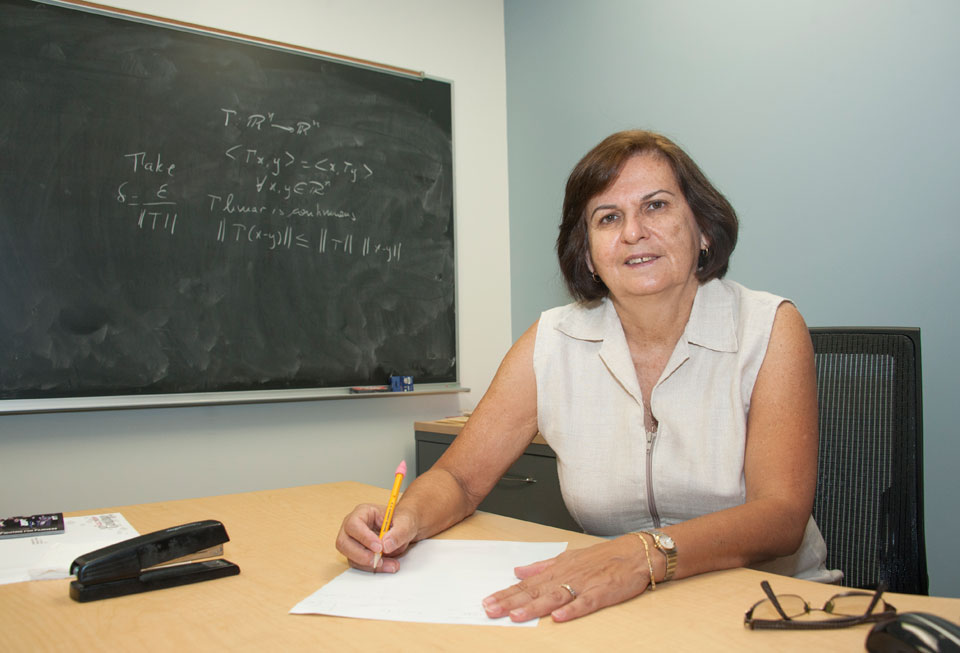

CSUN math professor Helena Noronha developed the original PUMP program at CSUN and oversaw its expansion to include nine other CSUs. Photo by Luis Garcia.
The Department of Mathematics at California State University, Northridge has received one of the highest honors of the American Mathematics Society (AMS) for the development of a program that provides support to undergraduate students from underrepresented communities to go on and get their doctorates in the mathematical sciences.
The society announced it was giving CSUN its AMS Award for Exemplary Program or Achievement in a Mathematics Department last week, singling out the creation of the PUMP (Preparing Undergraduates through Mentoring toward Ph.D.s) program and its successor, the CSU Alliance for PUMP, which includes other campuses in the CSU system.
“The PUMP program has a tremendous impact on getting and keeping students from underrepresented groups in mathematics,” said Aloysius Helminck of North Carolina State University, who served as chair of the award selection committee. “The program started at CSUN and now includes 10 California State University campuses.
“PUMP takes students early in their college careers and gives them a summer boot camp in math, followed by research opportunities in the academic year,” Helminck said. “Students receive mentoring and are connected to the broader mathematical community by attending conferences. Most of them continue to graduate programs. The success of PUMP is due in large measure to the vision and dedication of its leadership. The program is highly deserving of this prestigious award.”
CSUN math professor Helena Noronha, who developed the original PUMP program at CSUN in 2005 and oversaw its expansion to include other CSUs in 2013, said she was pleased the program was receiving national recognition.
“It’s an honor for CSUN and the PUMP program to receive such a prestigious award,” Noronha said. “This award recognizes that with the appropriate training, encouragement and mentoring, underrepresented minority and first-generation college students can acquire the mathematics background and skills to enter top-quality Ph.D. programs. It also recognizes that one can build a ‘doctoral cultural’ in an undergraduate institution.”
She added that the program would not be the success it is without the “wholehearted support” from mathematics faculty at CSUN and the other participating CSU campuses.
Noronha started PUMP at CSUN in 2005 with a grant from the National Science Foundation (NSF). The goal was to prepare students for Ph.D. programs in the mathematical sciences. It was such a success that in 2013, Noronha received a new NSF grant to establish the CSU Alliance for PUMP. In addition to Northridge, the alliance now includes nine other Cal State campuses — Channel Islands, Dominguez Hills, Fresno, Fullerton, Long Beach, Los Angeles, Pomona, San Marcos and San Bernardino.
A key component of the PUMP program is its summer institute, which pays a stipend to sophomore and junior students to attend four weeks of intensive, rigorous courses in linear algebra and analysis. Those areas were chosen because they are fundamental to any specialization the students might choose in graduate school. Working together in the institute also forges long-lasting bonds among the students and greatly increases their motivation and confidence.
The summer institute also provides students with information about how to apply to and succeed in a doctoral program, and about the career opportunities open to them with an advanced degree in mathematics.
PUMP also provides the undergraduates the opportunity to do research, offering modest financial support to the faculty and students involved.
The AMS judges noted that undergraduate research has become an integral part of the CSUN mathematics department, “and this effect is now spreading to the other institutions in the CSU Alliance for PUMP. The activity fosters closer engagement between faculty and students, thereby leading naturally to better mentoring.”
PUMP also regularly encourages students to apply for off-campus opportunities and provides support for students to attend regional and national conferences.
Prior to the program, according to Noronha, the number of CSUN mathematics students applying to doctoral programs was nominal. Over the past decade, more than 50 CSUN math majors have enrolled in Ph.D. programs, many at top-tier institutions across the country. She noted that three PUMP students have received NSF graduate fellowships, and one received an NSF postdoctoral fellowship.
“What PUMP has done at CSUN, and is now spreading through the CSU Alliance, is to foster a ‘doctoral culture’ in an undergraduate institution,” Noronha said. “PUMP students thrive in this culture, which provides a structure and setting where their knowledge and aspirations can blossom.”